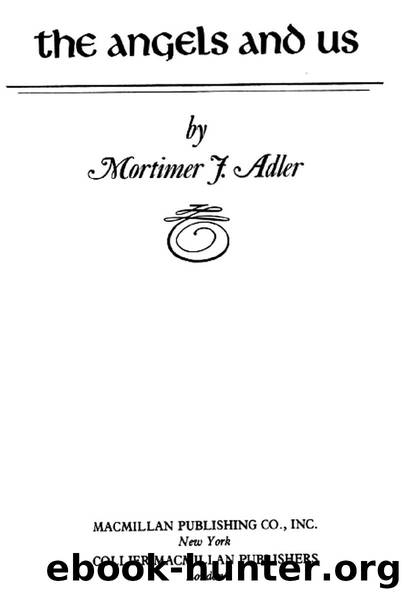The Angels and Us by Mortimer J. Adler

Author:Mortimer J. Adler
Language: eng
Format: epub
Publisher: Macmillan Publishing
Published: 1982-07-15T00:00:00+00:00
(2) Who Says That Angels Are Impossible?
Who, indeed? The materialists—those who assert that nothing exists except bodies, corporeal substances occupying physical space by their extension or bulk.
The atomists of antiquity—Leucippus and Democritus in Greece and their Roman disciple, Epicurus, whose views are celebrated in the great philosophical poem by Lucretius, On the Nature of Things —laid it down as their basic tenet that nothing exists except atoms and the void, the empty space in which atoms move about.
This central tenet of ancient atomism was espoused in modern times by Thomas Hobbes, whose views about the impossibility of angels we shall examine in a moment. Locke had Hobbes in mind in his effort to refute what he regarded as a dogmatic denial of spiritual substances.
Since the sixteenth century, materialism has become a much more sophisticated philosophical doctrine than that of atomism in either its ancient or its modern form. The notion of the atom as an absolutely indivisible unit of matter has been replaced by conceptions of the atom as a complex structure comprised of more elementary particles. Their divisibility or indivisibility does not affect the central tenet of the more sophisticated forms of materialism, which still declare that nothing exists except bodies.
Even when it is conceded that mental processes cannot be reduced to physical processes—that acts of the mind are distinguishable from the action of the brain—it is still stoutly maintained that mental acts do not occur independently of brain states. Just as seeing or hearing do not occur without the action of eyes or ears, so thinking does not occur without the action of the brain.
To concede, as the more moderate materialists do, that thinking is at least analytically distinguishable from brain action, is not, in their view, inconsistent with regarding brain action as both a necessary and a sufficient condition for thinking or any other act of mind.
Only the most extreme materialists, now generally discredited, persist in rejecting even an analytical distinction between mental and physical processes, regarding them as so completely identical as to be indistinguishable.
The notion of angels—of minds totally devoid of bodies—is anathema to materialists of every variety, atomistic or not, extreme or moderate. The gist of their argument runs as follows.
(i) Nothing exists except corporeal things, whether these be atoms, elementary particles of matter or units of energy, or complex bodies somehow constituted by these simpler components.
(ii) Angels are said to be incorporeal beings, minds without bodies, purely spiritual substances.
Therefore, angels—spiritual substances—do not exist.
Let us for the moment grant the truth of the first premise. The truth of the second premise is beyond question. From these two truths, the conclusion inexorably follows. It cannot be avoided or denied.
But what does that conclusion assert? That angels, spiritual substances, minds without bodies, do not really exist? Or that they cannot exist —that they are impossible? On the face of it, the former, and only the former.
From the assertion that nothing actually exists except corporeal things and from the acceptance of the statement that the word “angel”
Download
This site does not store any files on its server. We only index and link to content provided by other sites. Please contact the content providers to delete copyright contents if any and email us, we'll remove relevant links or contents immediately.
The remains of the day by Kazuo Ishiguro(8999)
Tools of Titans by Timothy Ferriss(8396)
Giovanni's Room by James Baldwin(7346)
The Black Swan by Nassim Nicholas Taleb(7129)
Inner Engineering: A Yogi's Guide to Joy by Sadhguru(6796)
The Way of Zen by Alan W. Watts(6614)
The Power of Now: A Guide to Spiritual Enlightenment by Eckhart Tolle(5781)
Asking the Right Questions: A Guide to Critical Thinking by M. Neil Browne & Stuart M. Keeley(5775)
The Six Wives Of Henry VIII (WOMEN IN HISTORY) by Fraser Antonia(5515)
Astrophysics for People in a Hurry by Neil DeGrasse Tyson(5190)
Housekeeping by Marilynne Robinson(4447)
12 Rules for Life by Jordan B. Peterson(4304)
Ikigai by Héctor García & Francesc Miralles(4274)
Double Down (Diary of a Wimpy Kid Book 11) by Jeff Kinney(4272)
The Ethical Slut by Janet W. Hardy(4253)
Skin in the Game by Nassim Nicholas Taleb(4248)
The Art of Happiness by The Dalai Lama(4130)
Skin in the Game: Hidden Asymmetries in Daily Life by Nassim Nicholas Taleb(4007)
Walking by Henry David Thoreau(3962)
